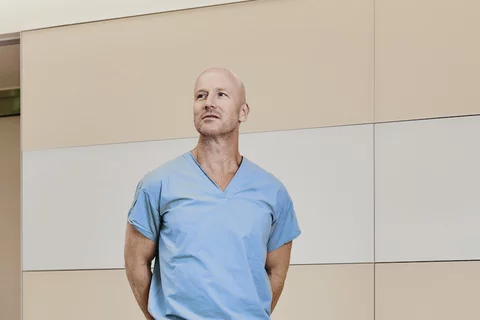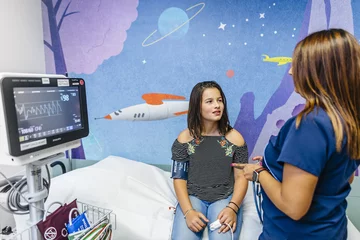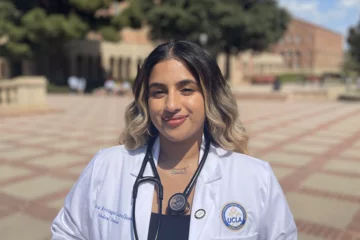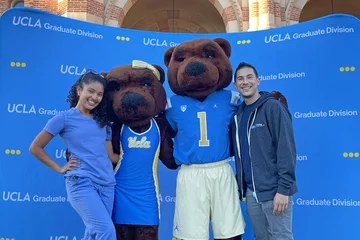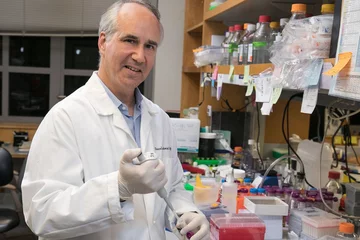Kidney Transplant Surgery Specialist
Meet Dr. Jeffrey Veale, the 2023 Terasaki Medical Innovation Award Winner
Urologist Jeffrey L. Veale, MD performs kidney transplant surgeries, directs the UCLA Kidney Transplantation Exchange Program, is the principal investigator of the UCLA Immune Tolerance Program, and trains the next generation of physicians as a professor at the David Geffen School of Medicine at UCLA (DGSOM).
A recognized innovator in his field, Dr. Veale led the development of a revolutionary kidney voucher program as well as a kidney transplant tolerance program, which earned him the 2023 Terasaki Medical Innovation Award.
His numerous accomplishments demonstrate a lifelong dedication to improving patient outcomes. However, he didn’t always know renal transplantation was his passion and his calling. He started medical school intending to be a pediatrician like his sister, who inspired him to pursue a career in medicine after a torn anterior cruciate ligament (ACL) ended his hockey career.
“She would come home and talk about all the people she’d helped,” he recalls.
During his clinical rotations, a kidney stone sent him branching off his sister’s path in pursuit of a different medical specialty.
He remembers the patient with the kidney stone arriving at the clinic in severe pain. The urologist on duty completed a procedure, and the next day, the patient was completely fine. Considering how it might feel to have the skills and knowledge to help a patient so much and so quickly, Dr. Veale knew he had to become a urologist.
Indeed, being a urologist has proved stimulating, rewarding, and fulfilling for Dr. Veale. While he feels honored to help individual patients by performing surgeries, his real passion is helping thousands of patients at once by introducing field-advancing innovations as well as educating surgeons-in-training, helping them develop the core skills they need to save lives.
Kidney Transplant Requirements for Donors
Good overall health is the most fundamental and important requirement for prospective kidney donors.
Ideal donors should not be at risk for certain conditions—including diabetes and cardiovascular disease—that might render them in need of their own kidney transplant in the future. Donors are typically between 18 and 70 years of age.
For potential kidney donors, meeting requirements represents the beginning of a long process. It involves several critical safeguards.
Donors should expect many appointments, lab tests, screenings, and imaging scans, including several kidney scans and tests to rule out problematic pre-existing conditions, such as cancer and diabetes. They’ll also meet with experts across many fields, including social workers, who need to ensure the donor hasn’t received or been promised money in exchange for their kidney.
“It's a journey,” Dr. Veale says, emphasizing that the process’s length is commensurate with its significance.
“Donors put their lives on the line, for no benefit to themselves, to help another person, a loved one and sometimes even a stranger,” he says. “And that is an incredibly big deal.”
Clay Garcelli wanted to save a life by donating his kidney, he ended up saving two
What would disqualify you from donating a kidney?
Some common conditions that might disqualify an individual from donating a kidney include:
- Cancer
- Diabetes
- High blood pressure
- History of kidney stones
- History of renal disease
Kidney Transplant Requirements for Recipients
To be eligible to receive a kidney transplant, an individual needs to have End-Stage Renal Disease (ESRD) (kidney failure) and be either on dialysis or about to be on dialysis.
Kidney transplant surgery candidates must also complete a thorough screening process, which checks for compliance across medical, social, and psychiatric factors.
“A donated organ is a real gift,” says Dr. Veale. “We want to make sure the recipient cherishes that gift and looks after it.”
Hopeful transplant recipients should check with their transplant center to understand the requirements for their specific situation, condition, and lifestyle.
Most recipients should expect to demonstrate adequate:
- Overall physical health to ensure transplant procedures have more potential to help than to harm.
- Overall psychological health that indicates capacity for managing the emotional and behavioral aspects of the transplantation process.
- Medical history, free from conditions, such as chronic infections, or high-risk lifestyle factors, such as substance abuse, that could negatively impact the patient’s health or the transplant’s viability.
- Social or familiar support systems that can provide the recipient with much-needed help throughout the transplantation and recovery process.
What disqualifies you from getting a kidney transplant?
Not meeting any of the requirements listed above and/or having aggressive cancer—which could get worse because of the immunosuppression medications required for transplantation—could make someone ineligible for kidney transplantation surgery.
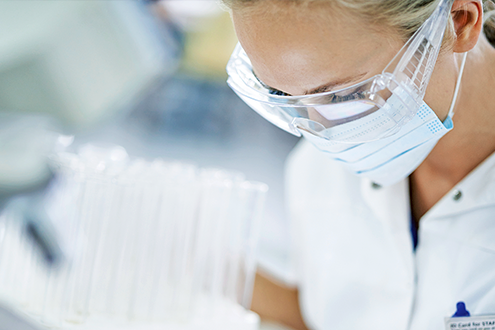
Donate Life Month
Observed every April, Donate Life Month celebrates the bravery, generosity, and life-saving contributions of individuals who’ve donated organs or have registered to donate organs in the future.
Dr. Veale hopes everyone will consider saving someone’s life by donating an organ. He also clarified a few common misconceptions that make some people feel needlessly hesitant about doing so.
Common Misconception #1: Healthcare professionals won’t do everything they can to save the lives of patients who are registered organ donors.
Dr. Veale says this belief is categorically untrue.
While there is an organ shortage in the United States, healthcare professionals are not trying to lessen that shortage with organs harvested from patients they could have saved. They are, however, addressing the shortage by innovating programs and following rigorous standards and protocols to ensure all donors and recipients receive ethical and equitable treatment.
Common Misconception #2: An individual can donate their kidney to a loved one only if they’re fully compatible.
“You may think you have to be this perfect match,” says Dr. Veale. “But you don’t if you come to UCLA. You just need to be healthy.”
He estimates that an individual donor has a 60-70% chance of being able to donate to their desired recipient. However, if they’re unable to donate to this recipient for any reason, they can make a general donation through the kidney exchange, receive a voucher, and rest assured that their loved one will receive the right compatible organ when they need it.
Innovations in Kidney Transplantation at UCLA
The UCLA Kidney Transplant Tolerance Program
The Kidney Transplant Tolerance Program centers around an immunosuppression-free protocol, which leverages the donor's stem cells to help optimize transplant acceptance while minimizing the use of immunosuppression medications associated with negative side effects, such as cancer, infections, and heart disease.
Transplant surgeons dampen a recipient’s immune system to stop it from attacking the donor’s grafted tissue, which it recognizes as originating from an outside body. While immune suppression is necessary for preventing transplant rejection, it also leaves patients vulnerable to other outside threats, thus the negative side effects.
Achieving tolerance without suppressing the immune system improves outcomes for the transplant recipients. Utilizing the donor’s stem cells also extends that donor’s gift.
“Usually, a kidney transplant functions for about 15 years,” Dr. Veale says. “If you get delayed tolerance, the transplant can—theoretically—function forever. The gift of the donor could last for the lifetime of the recipient.”
At present this technique has proven successful between sibling donors and recipients—even well after the initial kidney transplant surgery—but it could extend to other donor-recipient pairs down the road.
The UCLA Health Kidney Voucher Program
The UCLA Health Kidney Voucher Program allows individuals to donate a kidney when it makes sense for them and receive a voucher their intended recipient can redeem for transplantation later, whenever they need it.
The program started when Dr. Veale handed the first-ever kidney voucher to a grandfather who wanted to donate a kidney to his grandson, who wouldn’t need it for another ten years. To give out more vouchers, Dr. Veale faced opposition and had to convince colleagues across his field to support the idea.
Dr. Veale is proud to say 2024 marks the voucher program’s 10-year anniversary, and that within those ten years, the program has helped thousands of people.
“Now that multiple transplantation centers have adopted the innovative voucher program we developed at UCLA, over 5000 vouchers have been issued in the United States,” he says. “And there have been probably 10,000 living donor kidneys shipped across the country.”
